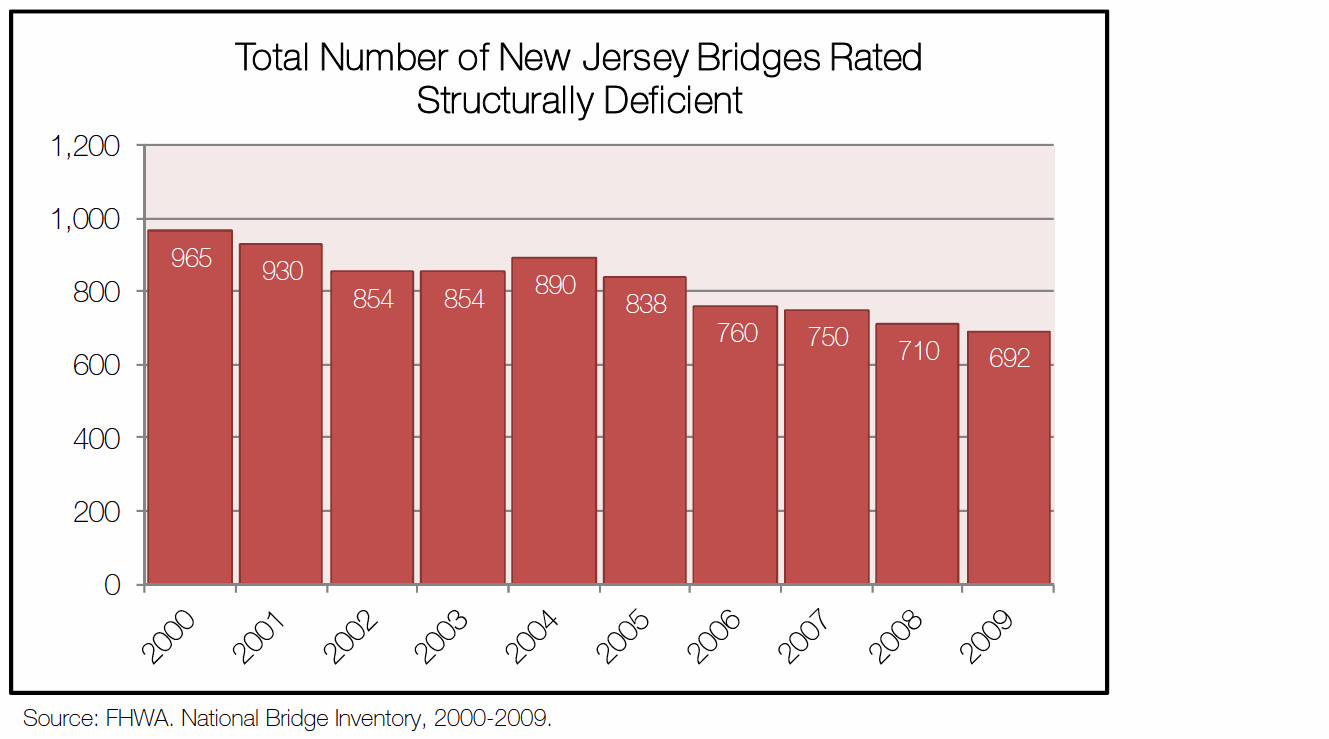TRI-STATE TRANSPORTATION CAMPAIGN
Introduction
With some of the oldest infrastructure in the country, New Jersey has its work cut out maintaining the state’s roads and bridges. More than 9,500 bridges cross the state’s numerous waterways or lift traffic over roads, highways, and railroad tracks. The state currently spends hundreds of millions annually in federal, state, and local funding to maintain those bridges and ensure that they remain safe to cross, with the state portion coming out of the primary state transportation funding source, Transportation Trust Fund.
But despite those investments, nearly 800 New Jersey bridges, representing more than eight percent of the total, exceed their expected lifespan of 75 years, according to data from the National Bridge Inventory. And the average age of the state’s bridges comes in at 41 years. More than 200 major bridges (on Interstates, freeways, and principal arterials) were rated structurally deficient, indicating they are in need of repair immediately or in the near future, according to the most recent federal data.
The state has made significant progress in reducing its backlog of deficient bridges. The 2000 Congestion Relief and Transportation Trust Fund Renewal Act established a goal of reducing the number and square footage of deficient bridges by half within 10 years. In the first decade since that law was passed, New Jersey has spent more than $4 billion on new bridges, repair and rehabilitation. Consequently, the number of structurally deficient bridges has fallen by 28 percent, and the square footage by 14 percent. The tragic 2007 collapse of Minneapolis’s I-35W bridge spurred additional investment in the Garden State’s bridges at the end of the decade.
But the insolvency of New Jersey’s Transportation Trust Fund, which not only provides dedicated state funding to transportation projects, but also serves as the primary source of matching funds for hundreds of millions of dollars in federal transportation funding, threatens to derail that progress. Without a sustainable source of long-term funding, New Jersey may have to defer critical bridge replacement, rehabilitation, and repair projects, and its backlog of deficient bridges will likely grow.
Recommendations
1. Identify a new long-term sustainable funding solution to the Transportation Trust Fund revenue crisis.
2. Continue the state’s fix it first policy by fixing existing infrastructure before building new roads and bridges.
3. Require NJDOT to make significant and documented progress on reducing the backlog of deficient bridges.
4. Maintain funding for transit projects and operations in order to curb traffic and reduce future wear-and-tear on bridges and other infrastructure.
5. Redirect state ARC funding for transit projects and bridge and road repair.
View Map of structurally deficient bridges in New Jersey
Download full report: More than a Bandage for New Jersey’s Crumbling Bridges
About Tri-State Transportation Campaign
www.tstc.org
“The Tri-State Transportation Campaign is a 501(c)(3) non-profit organization dedicated to reducing car dependency in New York, New Jersey, and Connecticut. Leading environmental and planning organizations formed the Campaign in the early nineties as a response to the mounting economic and environmental costs of automobile and truck dependence and promising reforms in federal transportation policy.”
Tags: Arc, New Jersey, New Jersey Department of Transportation, NJ, NJDOT, Tri-State Transportation Campaign








 RSS Feed
RSS Feed